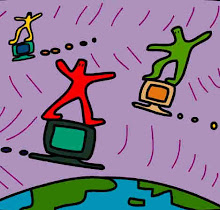hey readers!!!

With the ongoing debate on the positive and negative effects of the Internet, I feel that it is time to discuss the significance of the two different arguments. Which effects are in fact significant? Which effects are indeed negligible?
The apparent negative effects that can be easily identified are symptoms of computer addiction. As Wieland says, computer addiction may lead to depression, gambling, substance abuse and marital infidelity and divorce. Throughout the article, Computer Addiction, Wieland takes a negative perspective of technological advances in general. She asserts that overusing technology could result in negligence of others and self as a result of computer addiction. However Wellman and Kraut et al., in 2002, reported the positive effects of Internet use on communication, social involvement and well-being.
Kraut says that over 90% of Internet users email every day and that leads to increased time online and discourages them from going offline. Putnam says that the increase in other communication services online make up “virtual social capital.” The Internet allows people to connect without geographical restrictions allowing for broader access increased social involvement. It also facilitates that creation of new relationships, social identity and commitment among otherwise disconnected people. However Putnam states that communication online may encourage people to spend more time alone, and forming superficial relations forgoing the expense of deeper discussion and companionship. Wieland, at a more sever level, finds that although a useful tool for communication, virtual relationships may involve into online marital infidelity or online sexuality compulsive behaviors.

There are increasing health concerns regarding cyberspace disorders such as Internet addiction disorder and pathologic Internet use. This inability to control use of the Internet can lead to social isolation, family discord, divorce, academic difficulties, job loss and debt. However, Wieland recognizes that there were external factors that should have been taken into account - such as past histories of psychological problems. Wieland also supports the displacement hypothesis in saying that the individual spending time online decreases time for physical activities and socialization.

Kraut suggests two hypotheses: the “rich get richer” model predicting those who are highly sociable will get more social benefit from Internet use. They will be able to reinforce existing ties and as a result gain more social involvement; and the “social compensation” model predicts that those who lack social support would profit most from Internet use. Wellman validates this by how people are more willing to help and be involved because they can mask their identity and be anonymous. The study found, contradicting Putnam, that participants who used the Internet more had increases in the sizes of their local and distant social circle. Also their face-to-face interaction with friends and family had actually increased. Therefore we should not only well on the negative impacts on the Internet but also consider that benefits that users can take advantage of this new means of communication to develop online relationships into more ‘meaningful’ offline relationships.
Wellman takes on an optimistic perspective of the Internet. He focuses on how it has helped us, allowed for accuracy and speediness of information collecting. Sociologists have feared that rapid modernization would lead to loss of community, but I agree with Wellman in saying that the social groups have simply “relocated” to the virtual world rather than disappear altogether. It only makes sense for people to adapt to changes in the sociological trends that have always been happening. Also I feel that “virtual reality” is not a separate “reality,” rather it is integrated into our everyday life. The Internet does not restrict us from building close relationships but merely slows down the process due to the limitations in bandwidth transmission.
Currently we are increasingly dependent on computers to perform tasks for us, to run errands more efficiently etc. According to Wieland, every 3 months the rate of Internet use increases by 25%, which is substantial. Thus, the Internet these days play crucial role in everyday life. While the Internet is an excellent source of information and means of communication, it is difficult to ignore the health risks associated with prolonged use.
http://www.mysocialnetwork.net/blog/410/y30/2006/09/implications_of_the_effects_of.html







No comments:
Post a Comment